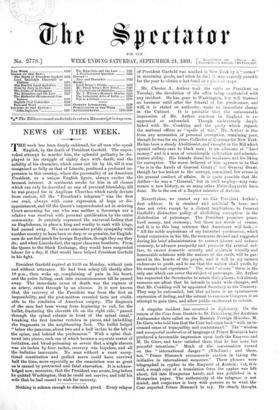Mr. Chester A. Arthur took the oaths as President on
Tuesday, the devolution of the office being unattended with any incident. He has gone to Washington, but will transact no business until after the funeral of his predecessor, and will, it is stated on authority, make no immediate change in the Cabinet. It is probable that the unfavourable impression of Mr. Arthur common in England is ex- aggerated or unfounded. Though undoubtedly deeply linked with Mr. Conkling and the party which regards the national offices as "spoils of war," Mr. Arthur is free from any accusation of personal corruption, remaining poor, though he was for six years Collector of Customs for New York. He has been a steady Abolitionist, and brought in the Bill which. opened railway-cars to black men ; is an advocate of "hard money," and is a man of considerable cultivation and adminis- trative ability. His friends dread his weakness, not his liking for corruption. The worst believed of him appears to be that "he is in the hands of General Grant ;" but General Grant, though far too lenient to the corrupt, committed few errors in the general conduct of affairs. It is quite possible that Mr. Arthur—he was a "General," but in civil employ—may com- mence a new history, as so many other Heirs-Apparent have done. He is the son of a Baptist minister of Antrim.






























